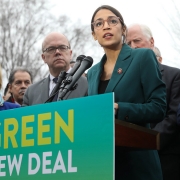California’s Broken Diversity Promise
Few states are more ostentatious in their concern for racial equality and minority uplift than California. The Golden State leads the nation in promoting racial reparations, doggedly supports affirmative-action quotas, and pays students to teach educators about implicit bias. From his first day in office, Governor Gavin Newsom has deemed addressing inequality a “moral imperative” in his fight for “a California for all.”
A new report from Chapman University’s Center for Demographics and Policy, to which we both contributed, suggests the state is falling short of these lofty ideals. We and our coauthors demonstrate how California’s Latinos, who account for nearly 40 percent of the state’s population and over half of its residents under age 18, lag significantly behind their peers in rival states like Texas and Florida in terms of incomes, homeownership, and education. California’s policy agenda, with its dual focus on welfare expansion and climate alarmism, has undermined the economic potential of the state’s Latinos—and undercut the governor’s promises.
The problems start at the aggregate level. California has the nation’s highest unemployment rate and slowest pace of job growth, along with a huge structural budget deficit. California creates middle-income jobs—critical for Latinos seeking to climb the income ladder—at among the lowest rates in the country. Over the past decade, the state has lost 1.6 million above-average-paying jobs, and 85 percent of its new positions have been in the lower-paying service sector.
Here the aspirations of both Latino entrepreneurs and workers could be crushed. The Small Business Regulation Index ranks California’s as the worst business climate for small firms, which disproportionately harms Latinos, whose businesses tend to be smaller and less capitalized. California’s recently mandated $20 minimum hourly wage for fast-food workers, for example, may help some individual Latinos, but it could both reduce total employment and threaten the livelihoods of smaller franchisees, many of whom are minorities.
Latino residents also are particularly vulnerable to California’s war on the carbon economy. Hispanics make up well over 90 percent of the state’s agricultural workers, more than 50 percent of its construction workers, and roughly 30 percent of its oil and gas workers—precisely the kinds of jobs that California’s green agenda disfavors.
For Latinos in California, the impact of that agenda shows up most clearly in the logistics industry. As Chapman University Business School professor Marshall Toplansky notes, Hispanics make up roughly 50 percent of California’s transportation workers, the highest percentage of any state. The Golden State’s green mandates, which encourage shipping companies to pursue rapid electrification, will likely send shippers to other ports. Electric trucks, with their huge batteries, can cost over $400,000 per vehicle; they cannot run long hauls without stopping for lengthy charging periods, undermining the economics of a trucking fleet.
Read the rest of this piece at City Journal.
Joel Kotkin is the author of The Coming of Neo-Feudalism: A Warning to the Global Middle Class. He is the Roger Hobbs Presidential Fellow in Urban Futures at Chapman University and and directs the Center for Demographics and Policy there. Learn more at joelkotkin.com and follow him on Twitter @joelkotkin.
Soledad Ursúa is Principal at Orinoco Equities and is a member of the board of directors of the Venice Neighborhood Council in the Los Angeles area. Her undergraduate degree from University of California Santa Barbara was in Global and International Studies and Spanish. She has a master’s in finance from the New School and worked in the New York venture capital industry.
Homepage photo: Omar Lopez, via Unsplash under CC 1.0 License.




 Senate Democrats, used under CC 2.0 License
Senate Democrats, used under CC 2.0 License Gage Skidmore, CC 2.0 License
Gage Skidmore, CC 2.0 License


